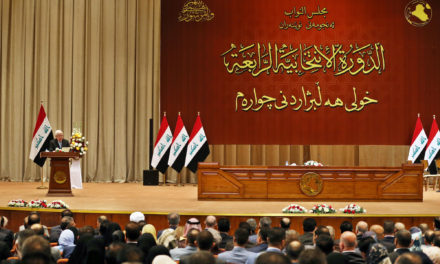Today, Iraqis on social media have been buzzing with contempt for the U.S. National Defense Authorization Bill which, in Section 1223, calls for the recognition of Sunni and Kurdish militias as “a country” for direct armament and assistance. Does that sound worrisome? It surely does. I couldn’t help but look for the draft bill to find out for myself what the real issue was. Section 1223 of the Bill is titled, “Modification of Authority to Provide Assistance to Counter the Islamic State of Iraq and the Levant.” It is only three paragraphs long, so how bad can it be?
Well, at first glance, the Bill section seems harmless. It begins by authorizing the U.S. Secretary of Defense to provide $715 million in the fiscal year of 2016 to the military and “other security forces of or associated with the Government of the Republic of Iraq, including Kurdish and tribal security forces or other local security forces with a national security mission.” That seems to promote Iraqi unity and national interests, right? In the same paragraph, the Bill section requires that “not less than 25 percent of such funds be expended for direct assistance to the Kurdish Peshmerga, the Sunni tribal security forces with a national security mission, and the Iraqi Sunni National Guard.” Again, that sounds harmless, right? However, there currently is no “Iraqi Sunni National Guard”. A bill has been proposed to the Iraqi Parliament, recommending the establishment of a predominantly-Sunni National Guard, yet has faced much opposition for its openly sectarian makeup. Some have supported it as an effort to balance the predominantly Shiite Paramilitaries. Yet shouldn’t any National Guard be representative of all components of a society? This proposed Iraqi bill has also warranted concerns about possible infiltration of the “Sunni National Guard” by pro-I.S.I.S. Sunni persons, thereby threatening national interests more than they already are by corruption within high positions in the National Armed Forces. Needless to say, the U.S. National Defense Authorization Bill treats the Iraqi Sunni National Guard as if it were already in place, when it really isn’t.
In the second paragraph, the Bill section briefly discusses the “political inclusion of ethnic and sectarian minorities within the security forces of Iraq.” At first glance, this sounds harmless, too. In fact, it sounds fantastic. The draft Bill goes on to authorize that fiscal 2016 assistance be directly withheld from the Government of Iraq in the case of not substantially achieving such inclusion conditions. This failure would be determined in an assessment by the U.S. Secretary of Defense and Secretary of State. The Bill section goes further by requiring, in such conditions, that no less than “60 percent of all fiscal year 2016 unobligated funds” be granted to the Kurdish Peshmerga, the Sunni tribal security forces with a national security mission, and the Iraqi Sunni National Guard.” Interestingly, the Secretary of Defense would be required – not advised or authorized – to provide these funds. Also interesting is the provision of assistance to a non-existent entity like the Sunni National Guard. More curious is that funds would be withheld from the Central Government of Iraq, but granted to non-state entities and armed groups. Whether that constitutes a threat to Iraqi national security and military sovereignty is not covered in this draft Bill. Whether it grants particular, non-state militant groups exceptionalism is also not covered in this draft Bill.
Moreover, since this “requirement” is based on the principle of including ethnic and sectarian minorities within the security forces of Iraq, it is curious that Assyrian, Ezidi, and Turkomen militias or militant groups are not included in this “discussion”. None of these ethnic and sectarian minorities are considered important enough to receive “required” direct assistance from the U.S. in the case of non-sufficient inclusion in state security forces. As such, the draft Bill does not seem overly concerned with the inclusion of ethnic and sectarian minorities in state security forces; rather it seems more concerned with granting what it deems to be opposition groups to the Central Iraqi Government with enough assistance to challenge its National Armed Forces and Shiite paramilitaries (that have recently been deemed a state institution by the Iraqi Cabinet). It hereby “requires” possible, further instability and warfare in the future. This “requirement” also provides dangerous precedence to preferential treatment for certain groups in Iraq over others.
Another concern, and this may arise from an uninformed position on the details of American Senate bills, is with the term “unobligated funds”. To what does it refer? Of what total is 60 percent required assistance to Sunni and Kurdish forces in Iraq, while the Government of Iraq and other militant groups receive nothing?
Moving on to the third paragraph, and assuming that the first two paragraphs do not already warrant much concern, one can see why this draft Bill has received widespread condemnation. It, again, requires that the “Kurdish Peshmerga, the Sunni tribal security forces with a national security mission, and the Iraqi Sunni National Guard be deemed a country.” This would allow these security forces to directly receive assistance from the United States under this section, should no assessment be provided by the Secretaries of Defense and State, or that they provide an assessment that the Government of Iraq has not substantially met the conditions outlined earlier in the section relating to requirements for assistance. Curious enough is the choice of language in this paragraph, “be deemed a country”, which would, in turn, allow particular forces to directly receive assistance. What is the intended meaning behind this choice of language? Could not the drafters of this Bill have simply stated that security forces with a national security mission be treated as Iraqi state institutions worthy of direct assistance? But, again, why should they be worthy of assistance, if they’re a) not all state institutions, and b) their umbrella State of Iraq does not receive assistance at all? Why deem them a “country” in particular? Though legalese tends to be ambiguous at times, it is also particular. Every word is premeditated. The Bill section does not state that these non-institutions be deemed a country solely for the purposes of receiving assistance. It requires that they be deemed a country, which would, in turn, allow for their assistance grant. To what other ends and purposes are these non-institutions deemed a country? How far will future Senate bills stretch this identification? Many Iraqi readers interpret this use of language as a threat of recognizing a country within a country in the future of Iraq – and that is where the fear and controversy lies.
Another question that begs to be asked within this context is the following. What authorizes the U.S. Congress to interfere in Iraqi politics; deciding whom to directly fund, apart from the Government of Iraq? Reading this text reminds one of past assistance provided by the U.S. to “moderate Syrian rebels” who, in the end, have a) joined I.S.I.S., b) sold weapons and hostages to I.S.I.S., and/or c) lost weapons to I.S.I.S. Seeing how that has worked out in Syria, one worries of a greater mess that could develop in Iraq. Iraq cannot tolerate any greater mess at this point in time. In its fight against terror, any assistance to groups in Iraq must only go through the Government of Iraq. Anything otherwise would be an effort to fragment Iraq, whether literally and directly, or effectively and indirectly.
At the end, Iraqis have every right to be concerned about the use of language in this Draft Bill. In fact, Americans have every right to be concerned about it, too. In the case of future fragmentation in Iraq, war would be highly likely among the different, armed groups, which would draw more American involvement. Of course, this also would mean more American tax monies spent overseas than domestically on issues that matter, such as a dwindling education system and economy, as well as exponentially decreasing water resources, and national reconciliation with African Americans who are rising against an increasingly repressive state.











